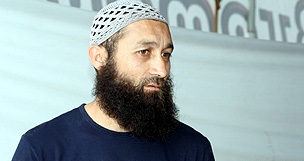Tajik authorities demand Belarus extradites Parviz Tursunov, ex-player of Vahdat football club “Hair”
Follow us on LinkedIn!

Parviz Tursunov, previously football player known for the beard he did not shave while playing for his club, was arrested mid-September in Belarus under the accusation of being involved in extremist activities.
Tursunov was accompanied by his wife and four children while trying to obtain political asylum in Europe. The representatives of the Ministry of Internal Affairs of Tajikistan stated they have provided Minsk with all necessary documentation for extradition of the football player. On October 20, press-secretary of the Ministry Umarjon Emomali stated that Tajik law-enforcement agencies communicated to their colleagues in Belarus that Parviz Tursunov is accused of extremist activities, is wanted on an international arrest warrant and has to be extradited to Tajikistan. Tursunov was fired from “Hair” football club for refusing to shave beard. According to his family, Parviz resided in Dubai and Turkey last seven years. On February 22, the Ministry of Internal Affairs of Tajikistan brought criminal charges against Parviz Tursunov pursuant to the first part of the Criminal Code article 307 (“Public calls for extremist activity”). Back then, Tursunov resided in Turkey together with his family. His family members said the authorities did not clarify on the charges and it remains unclear how and whom did football player called up to engage in extremist activities. Up to now, it remains impossible to check this statement from other sources; Tursunov himself did not provide media with a statement regarding the accusation. Tursunov’s arrest was confirmed on September 23 by his wife Sayora Subhonova from Kyiv. In her words, her husband was arrested on September 18 while trying to depart from Minsk airport. The airport staff led away Tursunov after checking his documents; he did not return back afterwards. Sayora Subhonova and her four children were kept in the airport for three days. Later, they were sent out to Ukraine. The human rights defenders raise concerns about Tursunov’s arrest in Belarus and extradition demand as they are wary of him being put to torture in Tajikistan. Thus, Human Rights Watch, Association of Central Asian migrants and Norwegian Helsinki Committee released a statement last week calling on Belarus to prevent Tursunov’s extradition. – The practice of continuous and harsh oppression of religious leaders in Tajikistan takes such a turn that one can be accused simply for having a beard. Belarus is obliged to keep Tursunov away from extradition to the country like Tajikistan, where he may face torture or ill-treatment. Belarus should uphold its international obligations, – said Steve Sverdlov, Human Rights Watch Central Asian researcher. Responding to the statements of human rights defenders, the officials from Ministry of Internal Affairs said it was “their (human rights advocates) opinion, while the extradition of Tursunov is based on the presented documents, as he is on an international wanted list”. On September 28, Belarus authorities confirmed the arrest of Parviz Tursunov, 43-years-old Tajik citizen accused of extremism. Dmitri Brilyov, the official representative of Belarus General Prosecutor’s Office, told Belarusian Telegraph Agency (BelTA) Tursunov is now in one of Minsk pretrial detention facilities. Brilyov underscored that his agency notified Tajikistan about Tursunov’s arrest and awaits the necessary documentation. – After receiving these documents, we will legally examine them, – Brilyov stressed. Parviz Tursunov’s name became known seven years ago. After he was fired from his club for refusing to shave his beard, his story was published in international media. Tursunov used to wear black breeches under the football shorts. He has been saying he follows Muslim traditions and reads Qur’an. According to one of his friends, Parviz Tursunov “has been hiding from the (law-enforcement) officers and residing abroad” for several years. Sayora Subhonova, Tursunov’s wife, admitted her husband started having problems after the news about his beard: “The problems started when he played football. At first, he was not allowed to play, then he was told to choose between his beard and football. He stopped playing. After six years, we left the country and arrived to Dubai”. According to Subhonova, the authorities accused her husband of adherence to Salafi movement. Parviz Tursunov’s family said his case is being reviewed in Minsk and it is not clear what decision will be taken. One of the sources said that after Tursunov was detained, his wife Sayora Subhonova returned to Tajikistan together with their children. According to the legislation of Tajikistan, calling for engagement in extremist activities in Tajikistan are punishable by hefty fines or imprisonment for a period of up to five years. The predominant part of Tajikistan’s population (up to 90%) are Muslims of Hanafi madhab. The authorities banned some other religious movements, including Salafi, declaring them to be a threat for state security. Only during the last year, hundreds of Tajikistan citizens were detained under the accusation of being involved in extremist activities; most of them were also accused of being Salafi followers. “Salafism” is one of Islam madhabs widely spread in Saudi Arabia. Sometimes Salafi followers are also called wahhabists. In 2009, the Supreme Court of Tajikistan banned Salafi movement; in 2014, it declared the movement to be extremist. The fight against Salafi adherents intensified in 2015. The General Prosecutor’s Office highlights that more than a thousand of Tajik citizens left to Syria and Iraq to join Islamic State after being exposed to Salafi propaganda. According to the data of General Prosecutor Yusuf Rahmon, 85 percent of Tajik citizens who joined IS were labor migrants leaving for war from Russia. Sarvinoz RuhulloThis publication was produced in cooperation with IWPR Tajikistan under the project “Empowering Community Voices: Combatting Radicalization in Tajikistan”.

